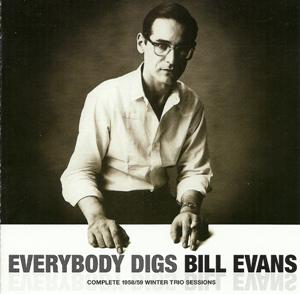1. Minority
2. Young and Foolish
3. Lucky To Be Me
4. Night and Day
5. Epilogue
6. Tenderly
7. Peace Piece
8. What Is There To Say?
9. Oleo
10. Epilogue
11. You and the Night and the Music
12. How Am I to Know?
13. Woody'n You (take 1)
14. Woody'n You (take 2)
15. My Heart Stood Still
16. On Green Dolphin Street
Bill Evans - Piano
Philly Joe Jones - Drums
Sam Jones - Bass (tracks 1-10)
Paul Chambers - Bass (tracks 11-16)
Despite the Bill Evans Trio that included Scott LaFaro and Paul Motian
being widely lauded as his greatest trio, I have never thought highly
of drummer Paul Motian, so I am glad to welcome this reissue of Bill
Evans's December 1958 album, which used Philly Joe Jones on drums.
In fact this was only Bill's second album, issued two years after
his trio debut, New Jazz Conceptions, and it was recorded after
Evans had been working in the famous Miles Davis Sextet. The album
title may sound rather dated, with its use of "digs" to mean "appreciates",
but the general enthusiasm for Bill Evans was proved by the original
album cover, which contained testimonials from Miles Davis, George
Shearing, Ahmad Jamal and Cannonball Adderley. This reissue adds six
tracks recorded in early January 1959, with Paul Chambers replacing
Sam Jones on bass. Strangely, this edition omits Leonard Bernstein's
composition Some Other Time (from On the Town), which
was added to the first CD reissue of the LP.
At any rate, this album provides good evidence of Bill Evans's already
considerable talent. The very first track - Gigi Gryce's Minority
- shows that Evans was adept at bebop styles but also that he already
had a formidable technique which could achieve almost anything he
wanted to do. In addition, this fastish number also proves that Bill
was a swinging pianist - perhaps notably when he swaps fours with
Philly Joe Jones.
Bill's treatment of Young and Foolish exemplifies what he is
probably best known for: the tender, thoughtful exposition of a ballad.
Actually it is Evans's thoughtfulness that strikes me throughout this
album. He was seldom a grandstanding player or a show-off: indeed,
I remember seeing him playing in London in the 1960s, with his head
bent so low over the piano that it almost touched the keyboard. Yet
he was notable for his thoughtful exploration of melodies and chords:
an art in which he was superior to many other pianists. Lucky To
Be Me also typifies this approach, with an unaccompanied performance
(one of four such solo items on the album) which is deeply pensive.
Undoubtedly the outstanding tune on the CD is Peace Piece,
a wonderfully contemplative performance based on a pattern of two
pedal notes and two chords, over which Bill weaves minimal but exquisite
ideas which are mesmerising in their simple beauty.
For contrast, there are plenty of up-tempo numbers driven along by
the drums. For example, Night and Day opens with an explosive
drum solo from Philly Joe, and Oleo is a speedy piece of bebop
with forceful drumming. To his credit, Philly Joe Jones matches Bill
Evans in thoughtfulness, as his solos always seem to be carefully
thought out. Note, for instance, his prudent solo with brushes in
You and the Night and the Music. Both the bass players fulfil
their roles well, although Sam Jones is recorded rather low in the
mix, taking the edge off his solos.
Even Bill Evans could falter, as you can hear in the weirdly misguided
chords at the start of the first take of Woody'n You and the stumbling
second take. But most of this album is an unalloyed delight.
Tony Augarde
